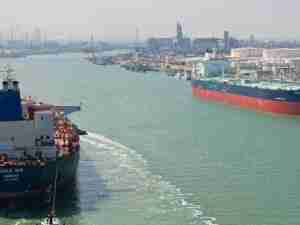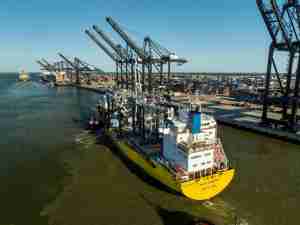The U.S. District Court upheld the legality of the Port of Los Angeles’ Clean Truck Program, which the Natural Resources Defense Council (NRDC) intervened on behalf of itself, the Sierra Club and Coalition for Clean Air to protect. The ruling enforces key safety elements and protects core aspects of the program allowing the port to require trucking companies to shoulder the responsibility of maintaining their own truck fleet rather than leaving the burden on the underpaid drivers.
“This victory bolsters the standing of burgeoning clean port programs across the nation,” said Melissa Lin Perrella, senior attorney with NRDC’s Southern California Air Program. “Millions of people live in port communities across the country and are forced to subsidize the operations of outdated port operations with their lungs. This decision allows the Port of Los Angeles to continue introducing cleaner trucks while getting dirty ones off the road and sets the stage for healthier communities nationwide.”
A recent report from the American Lung Association found that the port communities of Los Angeles and Long Beach continue to rank the worst in the country for ozone (smog) and particulate matter exposure, two air pollutants generated by diesel trucks.
“It’s essential we sustain the clean air achievements of LA’s clean truck program,” said David Pettit, senior attorney and director of NRDC’s Southern California Air Program. “Without regular truck maintenance, the region will be back at square one in terms of air pollution attributed to diesel trucks and port residents can’t afford that.”
The Clean Truck Program is designed to significantly reduce truck-related emissions and to manage and maintain these trucks for the long-term. Ports around the country recognize the need for a sustainable trucking workforce and are mobilizing to implement clean truck programs locally. Today’s decision stems from litigation brought in July 2008 by the American Trucking Associations (ATA) against the ports of Los Angeles and Long Beach.
Background
Since October 1, 2008, the Los Angeles Clean Truck Program has significantly reduced air pollution at the ports and in communities along freight transportation corridors by nearly 80 percent, a goal the Port of Los Angeles planned to achieve by 2012.
Los Angeles’s Clean Truck Program is part of a larger Clean Air Action Plan (CAAP) adopted in 2006 to clean up diesel pollution from Port-serving trucks, ships, trains, tug boats and other equipment. The CAAP seeks to expand the ports’ business operations and also reduce harmful air pollution impacts on the local port community and environment. The trucking fleet was included in the CAAP because the “independent owner-operator” trucking system that had evolved after trucking was deregulated in the 1990’s resulted in a fleet of nearly 17,000 dirty trucks serving the ports.
To fix this problem, the Port enacted a “concession” program that made the trucking companies (licensed motor carriers) responsible for truck maintenance through adherence to provisions within a concession agreement. An estimated $1.6 billion has been invested to replace an aging truck fleet with newer, cleaner vehicles at the ports of Los Angeles and Long Beach before 2012. The Port of Los Angeles put up millions of dollars in incentives to help trucking companies transition to clean trucks. Many trucking companies at the port took advantage of these incentives, but the ATA filed suit, claiming that the concession agreement that is the heart of the Clean Truck Program violates federal law.
The ATA tried, but failed, to have provisions within the port’s concession agreement thrown out on legal grounds under the Federal Aviation Administration Authorization Act, which restricts, in some circumstances, local governments from regulating the prices, routes or services of trucking companies. ATA also brought, and lost, a claim under the Commerce Clau










